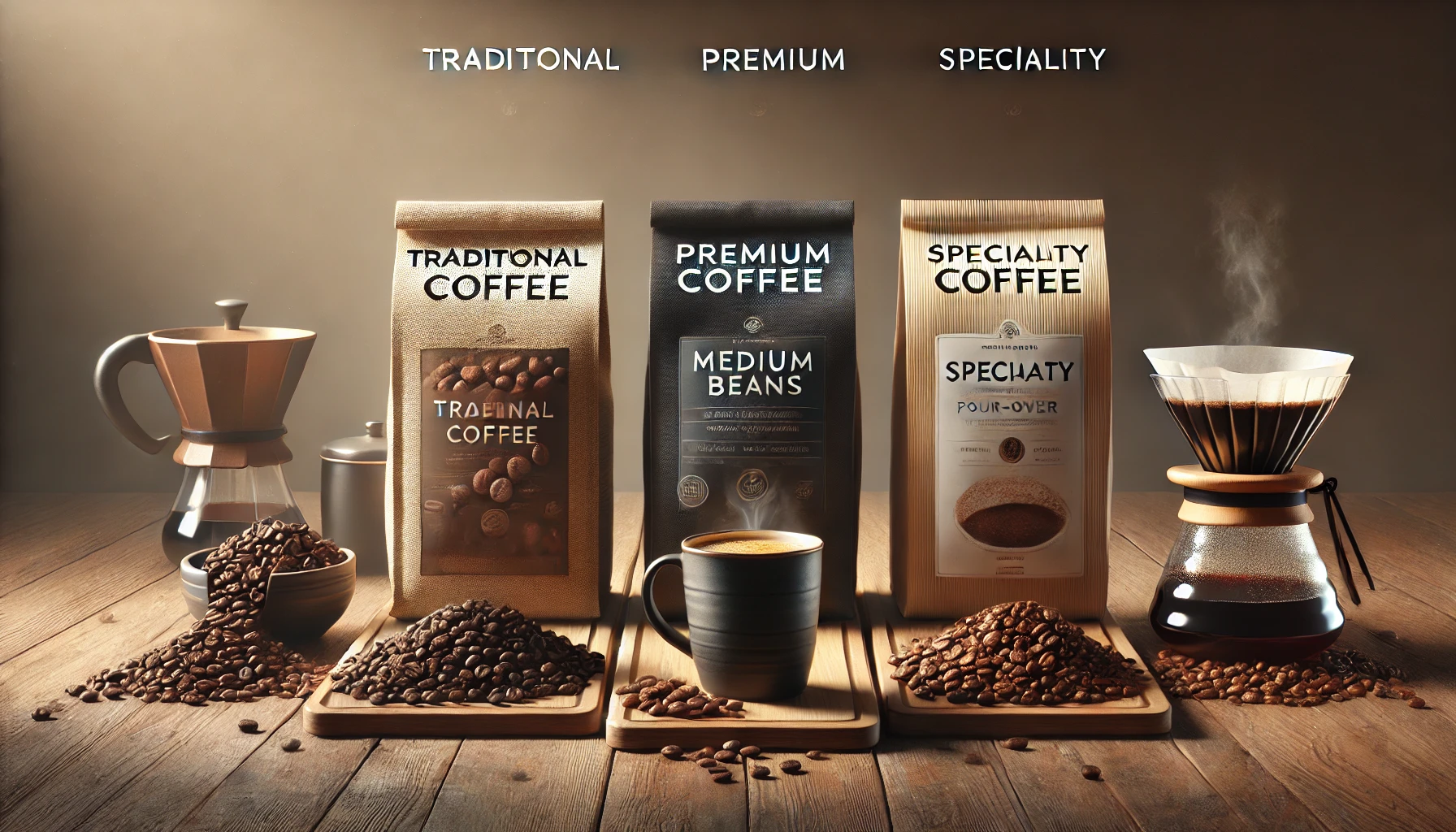Walk into any supermarket or café, and you’ll see bags of coffee labeled with words like “traditional,” “premium,” or “specialty.” While these terms are often used to attract attention, they can also reveal a lot about the quality, origin, and flavor of the coffee you’re buying—if you know what to look for.
In this article, we’ll break down what each of these labels really means, how they compare, and which one is the right choice for your next cup.
Traditional Coffee: Affordable and Accessible
Traditional coffee typically refers to mass-produced coffee that’s widely available in grocery stores and consumed daily in homes and offices around the world.
Characteristics
- Usually made from a blend of Arabica and Robusta beans
- Often dark roasted to mask inconsistencies in flavor
- May include lower-grade beans or broken pieces
- Commonly pre-ground for convenience
Flavor Profile
Traditional coffee tends to be strong, bitter, and consistent. It may lack complexity, but it offers a reliable and familiar taste for those who enjoy a bold cup.
Price Point
This is the most budget-friendly option and is often sold in large volumes. It’s ideal for those who prioritize price and convenience over flavor exploration.
Best For
- Everyday, no-fuss coffee drinkers
- Office coffee machines
- Those who add sugar or milk to their coffee
Premium Coffee: A Step Up in Quality
Premium coffee sits somewhere between traditional and specialty coffee. It’s typically marketed as being of higher quality than basic supermarket brands, but not necessarily at the level of specialty-grade beans.
Characteristics
- Made primarily from 100% Arabica beans
- More attention to sourcing and roasting
- Can include single-origin or blend varieties
- Often available as whole bean and sometimes freshly roasted
Flavor Profile
Premium coffee tends to have richer, smoother flavors than traditional options, with less bitterness and more balanced acidity.
It may offer light notes of chocolate, nuts, or fruit, depending on the origin and roast, but without the complexity of true specialty coffee.
Price Point
Premium coffee usually costs more than traditional options but remains accessible for most consumers. It offers a good balance between price and flavor quality.
Best For
- Coffee drinkers seeking better taste without a steep price tag
- Those who prefer whole beans and grind at home
- Brewing methods like French press, drip, or pour-over
Specialty Coffee: The Highest Standard
Specialty coffee is not a marketing term—it’s a regulated and graded category defined by the Specialty Coffee Association (SCA). To qualify, coffee must score 80 points or higher on a 100-point quality scale.
Characteristics
- Typically single-origin (from a specific farm or region)
- Carefully grown, harvested, and processed
- Free from defects and impurities
- Roasted in small batches to highlight unique flavors
- Often purchased from direct trade or fair trade sources
Flavor Profile
Specialty coffee delivers complex, layered flavors. Depending on the bean and roast, you might taste floral, fruity, citrusy, chocolaty, or even spicy notes.
It emphasizes clarity, aroma, sweetness, and balance. Each sip tells a story of where the coffee came from and how it was prepared.
Price Point
Specialty coffee is the most expensive of the three categories—but for good reason. The price reflects the care at every stage, from farm to cup.
It’s often sold in smaller quantities and aimed at coffee lovers who value origin, ethics, and taste.
Best For
- Home brewers passionate about coffee
- Pour-over, AeroPress, Chemex, or espresso users
- Those who appreciate flavor subtleties and origin transparency
Comparison Table
| Feature | Traditional Coffee | Premium Coffee | Specialty Coffee |
|---|---|---|---|
| Bean Type | Blend (Arabica + Robusta) | Mostly 100% Arabica | 100% Arabica, single-origin |
| Quality Control | Low | Moderate | High (graded + certified) |
| Flavor | Bitter, strong, simple | Smoother, mild complexity | Complex, clean, nuanced |
| Price | Low | Medium | High |
| Availability | Widely available | Specialty sections/stores | Cafés, roasters, online |
| Roast Date | Often missing | Sometimes provided | Always listed (fresh) |
| Best For | Convenience, budget | Everyday better coffee | Flavor exploration, quality |
How to Choose What’s Right for You
Your choice depends on what matters most to you:
- If you want affordability and consistency, traditional coffee might suit your routine.
- If you enjoy better flavor and are open to whole beans, premium coffee is a solid upgrade.
- If you want to explore the art, science, and ethics behind coffee, specialty is your path.
You can also use them for different occasions: traditional for bulk brews, premium for your daily cup, and specialty for your weekend ritual or guests.
Final Thoughts: Drink What You Love, But Know What You’re Buying
Understanding the difference between traditional, premium, and specialty coffee helps you make better choices—whether you’re upgrading your home setup or just looking for a smoother brew.
At the end of the day, the best coffee is the one that brings you joy. But knowing what’s in your cup empowers you to support better farming, roasting, and brewing practices—and to savor every drop with a deeper appreciation.
